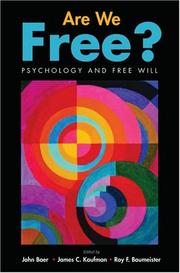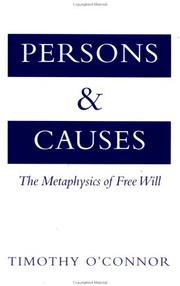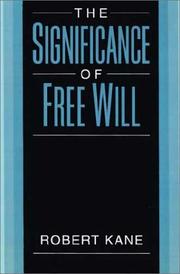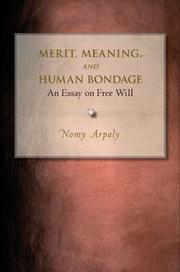| Listing 1 - 10 of 72 | << page >> |
Sort by
|
Book
ISBN: 9780199746996 9780199876877 Year: 2013 Publisher: Oxford Oxford University Press
Abstract | Keywords | Export | Availability | Bookmark
 Loading...
Loading...Choose an application
- Reference Manager
- EndNote
- RefWorks (Direct export to RefWorks)
There is growing evidence from the science of human behavior that our everyday, folk understanding of ourselves as conscious, rational, responsible agents may be radically mistaken. The science, some argue, recommends a view of conscious agency as merely epiphenomenal: an impotent accompaniment to the whirring unconscious machinery (the inner zombie!) that prepares, decides, and causes our behavior. This volume displays and explores this radical claim, revisiting the folk concept of the responsible agent after abandoning the image of a central executive and “decomposing” the notion of the conscious will into multiple interlocking aspects and functions. Part I of this volume provides an overview of the scientific research that has been taken to support “the zombie challenge.” Part II explores the phenomenology of agency and what it is like to be the author of one’s own actions. Part III and Part IV then explore different strategies for using the science and phenomenology of human agency to respond to the zombie challenge. Questions explored include: What distinguishes automatic behavior and voluntary action? What, if anything, does consciousness contribute to the voluntary control of behavior? What does the science of human behavior really tell us about the nature of self-control?
Philosophical anthropology --- Volonté --- Free will and determinism --- Compatibilism --- Determinism and free will --- Determinism and indeterminism --- Free agency --- Freedom and determinism --- Freedom of the will --- Indeterminism --- Liberty of the will --- Determinism (Philosophy) --- Volonté.
Book
ISBN: 3518064193 Year: 1980 Publisher: Frankfurt am Main
Abstract | Keywords | Export | Availability | Bookmark
 Loading...
Loading...Choose an application
- Reference Manager
- EndNote
- RefWorks (Direct export to RefWorks)
General ethics --- Free will and determinism --- Compatibilism --- Determinism and free will --- Determinism and indeterminism --- Free agency --- Freedom and determinism --- Freedom of the will --- Indeterminism --- Liberty of the will --- Determinism (Philosophy) --- Free will and determinism.

ISBN: 0198247907 0198247532 Year: 1984 Publisher: Oxford
Abstract | Keywords | Export | Availability | Bookmark
 Loading...
Loading...Choose an application
- Reference Manager
- EndNote
- RefWorks (Direct export to RefWorks)
General ethics --- Free will and determinism. --- Free will and determinism --- Compatibilism --- Determinism and free will --- Determinism and indeterminism --- Free agency --- Freedom and determinism --- Freedom of the will --- Indeterminism --- Liberty of the will --- Determinism (Philosophy)

ISBN: 9780195189636 0195189639 Year: 2008 Publisher: Oxford Oxford University Press
Abstract | Keywords | Export | Availability | Bookmark
 Loading...
Loading...Choose an application
- Reference Manager
- EndNote
- RefWorks (Direct export to RefWorks)
Philosophical anthropology --- Psychology --- Free will and determinism. --- Free will and determinism --- Compatibilism --- Determinism and free will --- Determinism and indeterminism --- Free agency --- Freedom and determinism --- Freedom of the will --- Indeterminism --- Liberty of the will --- Determinism (Philosophy)

ISBN: 019515374X 0195133080 0199867089 9786610472970 0585363420 1280472979 0198030509 1423762975 9780585363424 9781423762973 9780195133080 0190288434 Year: 2000 Publisher: New York (N.Y.): Oxford university press,
Abstract | Keywords | Export | Availability | Bookmark
 Loading...
Loading...Choose an application
- Reference Manager
- EndNote
- RefWorks (Direct export to RefWorks)
This title revisits the traditional explanation of freedom of will. O'Connor defines it as reason-guided agent causation and places his argument within a general metaphysics.
Philosophical anthropology --- General ethics --- Determinism (Philosophy). --- Free will and determinism. --- Free will and determinism --- Compatibilism --- Determinism and free will --- Determinism and indeterminism --- Free agency --- Freedom and determinism --- Freedom of the will --- Indeterminism --- Liberty of the will --- Determinism (Philosophy) --- Philosophy

ISBN: 0195105508 0195126564 0199868506 9786610655021 0585363927 128065502X 0198026528 0585278369 Year: 1998 Publisher: New York, N.Y. Oxford University Press
Abstract | Keywords | Export | Availability | Bookmark
 Loading...
Loading...Choose an application
- Reference Manager
- EndNote
- RefWorks (Direct export to RefWorks)
Free will and determinism --- Responsibility --- Accountability --- Moral responsibility --- Obligation --- Ethics --- Supererogation --- Compatibilism --- Determinism and free will --- Determinism and indeterminism --- Free agency --- Freedom and determinism --- Freedom of the will --- Indeterminism --- Liberty of the will --- Determinism (Philosophy) --- Philosophical anthropology --- General ethics
Book
ISBN: 0631135294 Year: 1986 Publisher: Oxford Blackwell
Abstract | Keywords | Export | Availability | Bookmark
 Loading...
Loading...Choose an application
- Reference Manager
- EndNote
- RefWorks (Direct export to RefWorks)
Free will and determinism --- Subconsciousness --- Unconscious (Psychology) --- Unconsciousness --- Psychology --- Compatibilism --- Determinism and free will --- Determinism and indeterminism --- Free agency --- Freedom and determinism --- Freedom of the will --- Indeterminism --- Liberty of the will --- Determinism (Philosophy) --- Freud, Sigmund --- Philosophical anthropology --- Depth psychology

ISBN: 0262532573 Year: 2004 Publisher: Cambridge, Mass. MIT
Abstract | Keywords | Export | Availability | Bookmark
 Loading...
Loading...Choose an application
- Reference Manager
- EndNote
- RefWorks (Direct export to RefWorks)
Free will and determinism --- Compatibilism --- Determinism and free will --- Determinism and indeterminism --- Free agency --- Freedom and determinism --- Freedom of the will --- Indeterminism --- Liberty of the will --- Philosophical anthropology --- General ethics --- Determinism (Philosophy)

ISBN: 1282303740 9786612303746 1400824508 9781400824502 0691124337 9780691124339 Year: 2006 Publisher: Princeton, N.J. Princeton University Press
Abstract | Keywords | Export | Availability | Bookmark
 Loading...
Loading...Choose an application
- Reference Manager
- EndNote
- RefWorks (Direct export to RefWorks)
Perhaps everything we think, feel, and do is determined, and humans--like stones or clouds--are slaves to the laws of nature. Would that be a terrible state? Philosophers who take the incompatibilist position think so, arguing that a deterministic world would be one without moral responsibility and perhaps without true love, meaningful art, and real rationality. But compatibilists and semicompatibilists argue that determinism need not worry us. As long as our actions stem, in an appropriate way, from us, or respond in some way to reasons, our actions are meaningful and can be judged on their moral (or other) merit. In this highly original work, Nomy Arpaly argues that a deterministic world does not preclude moral responsibility, rationality, and love--in short, meaningful lives--but that there would still be something lamentable about a deterministic world. A person may respond well to reasons, and her actions may faithfully reflect her true self or values, but she may still feel that she is not free. Arpaly argues that compatibilists and semicompatibilists are wrong to dismiss this feeling--for which there are no philosophical consolations--as philosophically irrelevant. On the way to this bittersweet conclusion, Arpaly sets forth surprising theories about acting for reasons, the widely accepted idea that "ought implies can," moral blame, and more.
Free will and determinism. --- Compatibilism --- Determinism and free will --- Determinism and indeterminism --- Free agency --- Freedom and determinism --- Freedom of the will --- Indeterminism --- Liberty of the will --- Determinism (Philosophy) --- Free will and determinism --- Philosophical anthropology
Book
ISBN: 1443810762 9781443810760 1847188672 9781847188670 Year: 2008 Publisher: Newcastle upon Tyne Cambridge Scholars Publishing
Abstract | Keywords | Export | Availability | Bookmark
 Loading...
Loading...Choose an application
- Reference Manager
- EndNote
- RefWorks (Direct export to RefWorks)
The problem of free will has fascinated philosophers since ancient times: Do we have free will, or at least the kind of free will that seems necessary for moral responsibility? Does determinism - the idea that everything that happens is necessitated to happen, given the past and the laws of nature - threaten the commonly held assumption that we are indeed free and morally responsible? Although these questions have been widely discussed in the past, the present volume offers a variety of new ...
Free will and determinism. --- Responsibility. --- Accountability --- Moral responsibility --- Obligation --- Ethics --- Supererogation --- Compatibilism --- Determinism and free will --- Determinism and indeterminism --- Free agency --- Freedom and determinism --- Freedom of the will --- Indeterminism --- Liberty of the will --- Determinism (Philosophy) --- Philosophical anthropology --- General ethics
| Listing 1 - 10 of 72 | << page >> |
Sort by
|

 Search
Search Feedback
Feedback About UniCat
About UniCat  Help
Help News
News